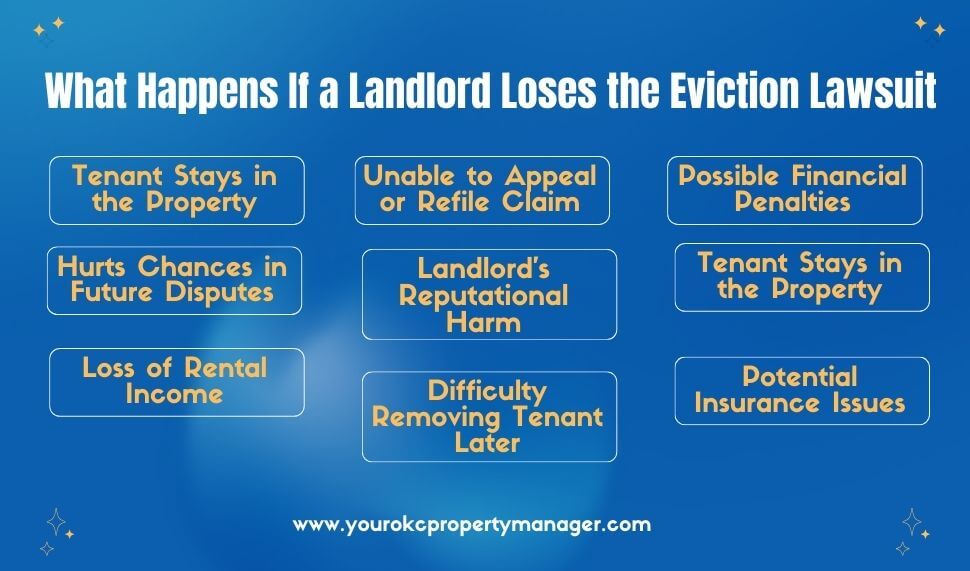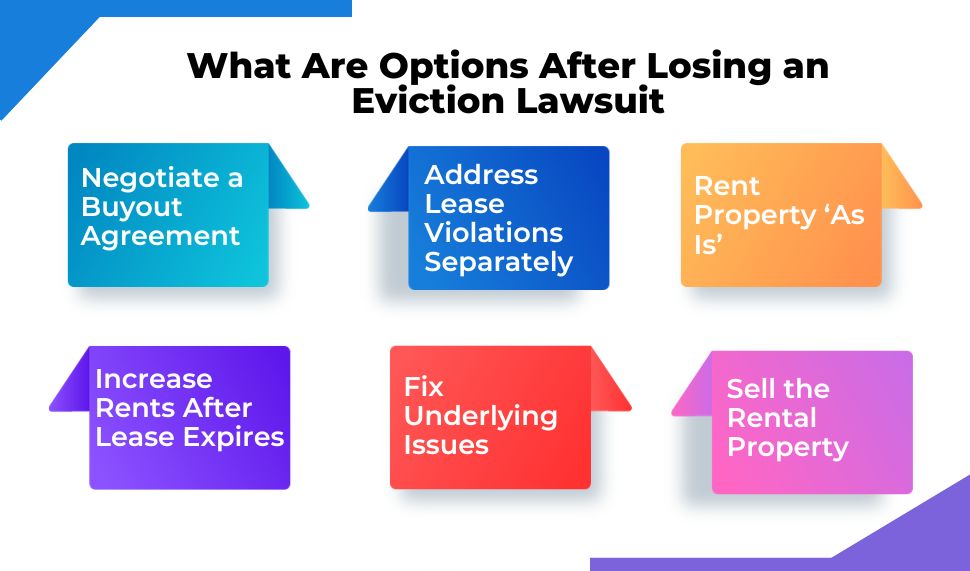Evicting a problematic tenant can be a stressful and overwhelming experience, even for the most experienced landlord. No matter how confident you are in your case, there’s always a risk that the judge may rule against you. According to a study conducted in 2020, approximately 2.3 million evictions occurred in the United States, and only 70% of eviction lawsuits are successful. In this article, I will address the consequences of what happens if landlord loses eviction case and provide specific tips for dealing with a lost eviction case.
[Also Read: 10 Legal Reasons For Tenant Eviction]
Reasons Why a Landlord May Lose An Eviction Case
While you have the right to regain possession of their rental properties, certain factors can lead to a landlord losing an eviction case. You must familiarize with local laws and regulations governing landlord-tenant relationships to avoid potential pitfalls in the eviction process. If you are unsure about how to proceed with an eviction, it is advisable to consult with an attorney. Here are the top reasons why a landlord may lose an eviction case:

Procedural Errors: You must follow proper legal procedures in the eviction process. Otherwise, the court can dismiss the case if found procedural errors when evicting a tenant. This can include not serving the tenant with the proper notices or not filing the eviction paperwork correctly.
Tenant Defenses: Tenants can raise valid legal defenses in response to an eviction lawsuit. These defenses can lead to a favorable outcome for the tenant. For example, a tenant might claim that the landlord breached the lease agreement, made oral promises contradicting the written lease, or waived certain lease violations in the past.
Insufficient Evidence: Evidence is the backbone of any eviction case. If you fail to prove their case with compelling evidence, the court will rule in favor of the tenant. This can include lease agreements, communication records, payment history, photographs, or other documentation of lease violations.
Discrimination: Discriminatory eviction practices are strictly prohibited under fair housing laws. Landlords who engage in eviction proceedings based on a tenant’s race, religion, family status, nationality, disability status, etc., can face legal challenges and the loss of an eviction case.
Retaliation: Many states strictly prohibit retaliatory eviction. Evicting the tenant in retaliation for the tenant reporting housing code violations or exercising their legal rights as a tenant can weaken the landlord’s eviction case or dismiss it.
Bankruptcy Filing by the Tenant: Tenant bankruptcy filings can create complications in the eviction process. Bankruptcy can temporarily halt eviction proceedings, leaving landlords in a legal limbo and potentially affecting the case’s outcome.
Lack of Landlord Standing: The person filing the eviction must have legal authority. If the party initiating the eviction lacks legal authorization to legally evict the tenant, the case gets dismissed due to the lack of proper standing.
Breach of Habitability: If the property being rented is uninhabitable due to unresolved issues that violate the implied warranty of habitability, the landlord’s filed eviction case is dismissed.
[Also Read: Illegal Property Management Practices You Should Avoid]
What Happens If Landlord Loses Eviction Case
If landlord loses eviction case, the tenant gets to stay in the property under the terms of the existing lease agreement. The court order will prevent the landlord from evicting them unless they violate the lease agreement again that give grounds for eviction. Landlords must follow the court’s orders carefully—failure to do so results in additional penalties, such as fines or even jail time. Here are the potential consequences if you lose an eviction case:

Tenant Stays in the Property: The main effect of losing an eviction case is that the tenant can remain on the rental property, as the landlord failed to provide enough evidence to terminate the lease. As a result of court judgment, the tenant continues living in the property under the terms of their existing lease. Unless the tenant later chooses to leave on their own accord, the landlord cannot force them out.
[Also Read: Oklahoma Tenters Rights]
Unable to Appeal or Refile Claim: Generally, landlords don’t get a second chance to pursue the same claims through an appeal of the court order or by re-filing the lawsuit. Judicial rulings on eviction cases are final, except in rare cases where the landlord can prove that the court made a legal error or relied on inaccurate facts. However, it is tough for landlords to succeed in these cases.
Possible Financial Penalties: Losing an eviction hearing can come with financial penalties for the landlord beyond letting the tenant stay. In some states, landlords can be ordered to pay the tenant’s legal fees related to defending against the lawsuit. Judges can also impose sizable punitive fines against landlords who are found to have filed wrongful, retaliatory, or frivolous eviction cases. These penalties are meant to deter abuses of the eviction process.
Damage to Landlord-Tenant Relationship: By nature, eviction lawsuits create an adversarial relationship between landlords and tenants, and losing in court can make the situation even more tense. Landlords can feel disinclined to cut tenants any breaks, while tenants may assert their rights more aggressively. Trust erodes, communication suffers, and the relationship becomes more impersonal.
Hurts Chances in Future Disputes: Losing an eviction case weakens the landlord’s position in future legal disputes with the same tenant. If new conflicts occur, like security deposits, and end up in court, the judge may view the landlord less favorably if they have previously failed to prove their eviction case.
Landlord’s Reputational Harm: Eviction cases are publicized so landlords who frequently lose their bad reputations start developing in the real estate community. This makes it more challenging for them to find new tenants or attract quality tenants in the future, as potential tenants check rental histories before entering the lease. The landlord’s ability to obtain financing or loans for conducting rental businesses also gets negatively impacted.
Loss of Rental Income: Landlords continue to lose rental income while the eviction process is ongoing and if the tenant still doesn’t pay rent as required. Landlords who have rental income as a major source of income are impacted more.
Potential Insurance Issues: Landlords can have difficulty obtaining or renewing insurance if they have a history of losing eviction lawsuits. This is because insurance companies view landlords with a history of eviction lawsuits as being more likely to have problems with tenants.
Difficulty Removing Tenant Later: A failed eviction case means the tenant remains on an active lease. It becomes harder to terminate the tenant’s tenancy in the future, even for valid reasons, since the landlord has already unsuccessfully tried removing them once.
Is It Possible to Evict a Tenant Without a Writ of Possession?
In Oklahoma, a writ of possession is a crucial legal requirement for evicting a tenant. It is illegal to evict a tenant without it. The eviction process in Oklahoma involves several steps, including properly terminating the tenancy or lease, giving proper notice of the eviction, and filing the eviction with the District Court.
If the occupants do not vacate after being notified, the landlord must obtain a court order for possession, which is then used to obtain a Writ of Assistance asking the sheriff to forcibly eject the tenant. It is important for landlords to carefully follow all the rules and procedures required by Oklahoma law when evicting. Otherwise, the eviction may not be valid.
What Are Options After Losing an Eviction Lawsuit?
Losing an eviction case doesn’t mean the landlord has no alternatives left. While they can’t immediately force the tenant out or appeal the judge’s decision, they can take other approaches to resolve or minimize the issues. Here are some of the potential next steps after an eviction loss:

Negotiate a Buyout Agreement: One alternative is negotiating a buyout agreement, in which the landlord pays the tenant to move out sooner than required voluntarily. This involves offering the tenant a cash payment, typically a few thousand dollars, to hand over the keys and terminate the tenancy early. It requires the tenant’s cooperation but may be worth it to avoid months of ongoing problems.
Address Lease Violations Separately: If the tenant violates rules but gets to stay, the landlord can issue additional lease violation notices and assess any applicable fees. For instance, you can charge late fees for unpaid rent or issue cleaning fees for property damages. This is still an option even after losing an eviction case related to those same lease infractions.
Rent Property ‘As Is’: The landlord could do minimal maintenance and rent the unit “as is” once the tenant leaves. This can be an appealing option for badly damaged units since it avoids the hassle and cost of repairs before turning over. Any deficiencies would simply be listed upfront in the new lease agreement.
Increase Rents After Lease Expires: Unless rent control laws apply, the landlord can raise the rent significantly after the lease ends and the unit transitions to a month-to-month term. If local regulations allow, doubling the rent or even more is possible. The tenant must decide whether staying in rental unit is worthwhile with the higher rent costs.
Fix Underlying Issues: Sometimes, an eviction notice stems from valid problems at the property, such as maintenance shortcomings by the landlord or unmet tenant requests. Where possible, the landlord can commit to fixing underlying issues to improve the tenancy going forward. This will involve better communication, quicker repairs, or lease amendments to address conflicts that triggered the dispute.
Sell the Rental Property: As an extreme last resort, the landlord can look to sell and exit the rental business entirely. While not ideal, this may make sense if relations with the tenant are completely beyond repair or the property has frequent tenant problems. This route requires the landlord to undergo the process of finding a buyer and closing on a sale.
Can An Eviction Judgement Be Reversed?
Yes, an eviction judgment can be reversed if you believe that the decision was made in error or if you have new evidence that was not considered during the initial proceedings. According to the Oklahoma Statutes Title 12, Section 12-1031.1, a court can correct, open, modify, or vacate a judgment or decree on its own initiative by thirty (30) days after the judgment has been filed. However, you should consult with a qualified attorney who specializes in landlord-tenant law. They can review the details of your case and advise you on the best course of action. Keep in mind that the rules and procedures regarding evictions vary by jurisdiction, so it’s important to seek legal advice specific to your situation and location.
Can a Tenant Sue a Landlord for Wrongful Eviction?
Yes, a tenant can sue a landlord for wrongful eviction. Tenants have legal rights if they believe they have been wrongfully evicted. In Oklahoma, landlords who engage in self-help evictions may be sued by tenants for actual, consequential damages or three months’ rent, whichever is greater. They may also have to cover the tenant’s attorney and litigation fees.
If a landlord violates state eviction regulations, the tenant can file a wrongful eviction lawsuit against them. Wrongfully evicted tenants have the option to take their landlord to court. If the landlord fails to follow proper eviction rules and guidelines, the tenant will have a solid case against them that can be costly for the landlord.
Evictions can cost a landlord thousands of dollars in legal fees and court costs. In addition to their own legal costs, a wrongful eviction might mean the landlord has to pay even more to the defending tenant. If the tenant wins the wrongful eviction case, the landlord has to pay for the tenants: attorney fees, litigation costs, damages, punitive damages (subject to state regulation), and repayment of the security deposit. Thus, landlords should always consult an attorney when pursuing an eviction to avoid any appearance of retaliation or other wrongdoing.
[Also Read: How To Kick Someone Out of Your House That’s Not on the Lease]
Conclusion
Losing an eviction lawsuit can be frustrating and costly for landlords, but it doesn’t mean the situation is hopeless. By exploring alternative solutions and learning from mistakes, landlords can take strategic action to address the issues and improve their chances of success in future eviction cases. Consulting with legal experts and maintaining detailed records are crucial steps in navigating the eviction filing process effectively. You can also feel free to reach out to Property Management OKC for expert eviction-related consultations.
What Happens If Landlord Loses Eviction Case: FAQs
What is an eviction case and how does it work?
An eviction case is a legal proceeding where a landlord sues a tenant for possession of the rental property. The process starts with the landlord serving the tenant with a notice to vacate the property. If the tenant fails to leave, the landlord can file a lawsuit in court. The court will then schedule a hearing where both parties can present their arguments and evidence.
What are the consequences of losing an eviction case?
Losing an eviction case can have serious consequences for the landlord. These may include:
-Loss of rental income
-Damage to the landlord’s reputation
-Legal fees and expenses
What are the possible outcomes of an eviction case?
If the landlord wins the case, the tenant will be ordered to leave the property. However, if the landlord loses the case, there are a few possible outcomes:
The tenant stays in the property
The landlord is ordered to pay damages
The landlord is ordered to pay the tenant’s legal fees
What are some steps a landlord can take to avoid losing an eviction case?
-Follow proper procedures
-Document everything
-Seek legal advice

Author
Scott Nachatilo is an investor, property manager and owner of OKC Home Realty Services – one of the best property management companies in Oklahoma City. His mission is to help landlords and real estate investors to manage their property in Oklahoma.
 (
(









